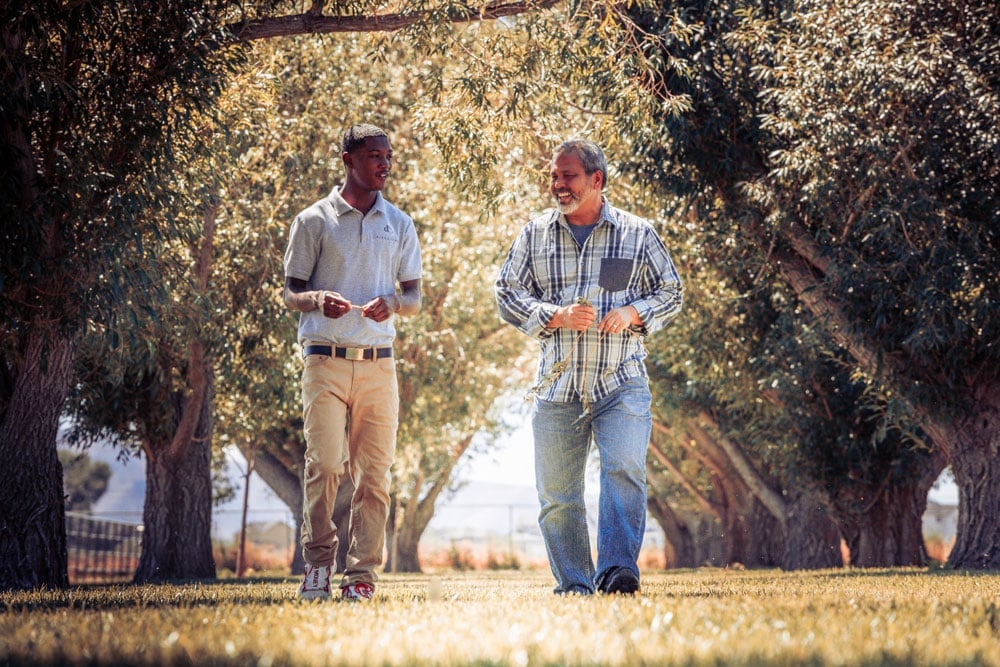Is your teen struggling to manage their anger? Do outbursts and frustration disrupt your family life? You're not alone. Many teenagers grapple with strong emotions, and learning healthy ways to express and manage anger is a crucial part of their development. Our residential treatment center is here to help your child.

Key Takeaways
Understanding teen anger requires looking beyond the outbursts to find effective solutions—these essential topics highlight what you'll learn in our comprehensive guide:
- Understanding Anger's Purpose: Anger is a normal emotion with purpose—it highlights values and motivates action—but teens need help developing healthy regulation skills to prevent aggression, substance use, and isolation.
- The Window of Tolerance: Parents should wait until everyone is calm (within their "Window of Tolerance") before addressing anger issues, as the "thinking brain" shuts down during emotional flooding.
- The Anger Iceberg: Look beneath the "Anger Iceberg"—teen anger often masks deeper emotions like shame, depression, or anxiety that need to be addressed for true healing.
- Discovery Ranch's Approach: Discovery Ranch offers a comprehensive approach combining therapy, experiential learning, and a supportive environment specifically designed for teens struggling with anger management.
- Building an Emotional Toolbox: Building an emotional regulation "toolbox" with techniques like deep breathing, mindfulness, and professional support helps teens learn to ride emotional waves rather than being overwhelmed by them.

At Discovery Ranch, we understand the impact that unmanaged anger can have on teenagers and their families. That's why we've developed a comprehensive residential program specifically designed to help your child learn to manage their anger and address the underlying issues causing it.
Key Benefits of Our Anger Management Program:
- Safe and Controlled Environment with Expert Guidance: Discovery Ranch offers a regulated environment free of the stimulations that push teens who are dealing with difficult emotions like anger over the edge. Highly qualified therapists provide their expertise to address the root cause of anger and will help angry teens develop healthy anger management techniques.
- A Holistic Approach to Healing: We go beyond traditional therapy by incorporating Individual & group therapy sessions and Experiential learning activities.
- A supportive peer environment: We aim to heal the entire person, creating a transformative journey for your son.
- Building a Brighter Future for Teens and Families: We go beyond just managing anger in the moment. Our goal is to equip teens with lifelong skills to build better relationships and a more balanced future.
If your son is struggling with anger management, Discovery Ranch can help.
Our specialized program provides the tools and support needed for emotional and academic success. Let us help your teen turn anger into a catalyst for growth.

Contact Discovery Ranch today to learn how our specialized autism treatment program can guide your teen towards a brighter, more fulfilling future.
Anger Management for Teens: If You Are the Parent of an Angry Teen, You Are Not Alone
For a lot of people, anger is an unpleasant or even frightening emotion. However, even anger has a purpose. Anger can be motivating. It can show us the things that are important to us. It can give us the strength to act when we need to change.
We all feel angry at times, but problems arise when people are not able to manage their anger healthily. This can be especially true of young people because they are facing new and challenging experiences with fewer life experiences to help them know how to manage and regulate their own emotions. Anger management therapy specifically geared towards teens can provide opportunities for peer support and practicing new skills in a supportive environment.
This article provides insights for parents and other concerned adults interested in understanding and helping teens to regulate their emotions. There are also indications when anger is a serious problem, as well as tips for teens themselves.

Understanding Anger
Anger tends to get a bad reputation as far as emotions go. Being on the receiving end of someone else’s anger sure can be scary. Sometimes, when you get angry, you may even scare yourself.
But the truth is, that anger by itself is not all that bad. It can:
- Highlight personal values (we get angry when something important to us is threatened)
- Motivate action (anger can push us to stand up for what we believe in)
However, when teens struggle to regulate their anger, it can lead to harmful behaviors. Anger management therapy helps teens:
- Recognize their triggers
- Develop emotional regulation skills
- Express anger in a healthy and constructive way
A Toolbox for Handling Difficult Emotions
Anger becomes a problem when people don’t know how to manage it.
That’s why it’s important to have a set of emotional regulation skills—a metaphorical toolbox—to handle all emotions, not just anger. These skills, including anger management techniques, help people process their feelings in healthy, constructive ways.
Without these tools, emotions can feel overwhelming, especially for teens who are still developing coping skills. With fewer life experiences and new, intense feelings, they may struggle to regulate their emotions effectively.
The good news? It’s never too late to build this toolbox. Learning emotional regulation skills can strengthen relationships for teens, parents, and the whole family.
What Are The Warning Signs Of Uncontrolled Anger In Teens?
Just about everyone gets angry sometimes. Anger can direct people to the things that matter to them or even motivate people to make a positive change.
However, when people do not know how to cope with anger in healthy ways, poor anger management can make already difficult situations worse. There are three major warning signs that your teen may not know how to manage anger in healthy ways.
- Aggression – This could be directed at family members, friends, or even themselves. If your teen’s anger leads to verbal outbursts, physical aggression, or destructive behavior, it’s a serious concern. Everyone in the home deserves to feel safe.
- Unhealthy Coping Mechanisms – Some teens turn to substance use or other risky behaviors to numb their emotions. Others avoid difficult emotions altogether, which can lead to skipping school, withdrawing from responsibilities, or shutting down emotionally.
- Avoidance & Self-Isolation – If your teen hides in their room or withdraws from family and friends instead of facing conflict, it may be a sign they are struggling to cope with their emotions. Avoidance doesn’t resolve anger—it just buries it.
If your teen is exhibiting any of these unhealthy anger coping skills, you may consider addressing these issues with a professional counselor.
What Should Parents Do (and Avoid) WHen Dealing with an Angry Teen?
1. Don't Rush. Wait Until You Are All Within Your Window of Tolerance.
Of course, teens are not the only people who struggle with anger. Parents and other adults have a difficult time with their anger too.
If you are the parent of an angry teenager, one of the best things that you can do to help is to make sure that you yourself are calm. Some parents think that when a problem arises, they need to deal with that problem immediately.
Note: If someone is in immediate harm or there is an imminent risk to safety, then it is important to handle the situation right away.
However, unless someone is in immediate danger, it may be best to deal with the situation once everyone's emotions have had a chance to calm down. It's okay to feel angry; recognizing and processing this emotion is important for both teens and adults.
Understanding the Window of Tolerance
Everyone has a certain amount of stress and negative emotions that they are able to cope with and remain functional. That is sometimes called the Window of Tolerance.
- Some people are able to cope with more challenging situations. Their Window of Tolerance is larger.
- Other people may struggle to cope with less complex challenges or negative situations. Their Window of Tolerance is smaller.
Teens have fewer life experiences than adults. They are also beginning to develop more complex emotions. This lack of experience and new emotions make it relatively easy for them to be pushed outside of their Window of Tolerance.
However, everyone—teens and adults—experiences difficulties that put us outside our Window of Tolerance from time to time. When this happens, it becomes a challenge to think clearly, respond rationally, and make healthy decisions.
Basically, if you are outside of your Window of Tolerance then your thinking brain has shut down. You are not able to reason or learn new information. Your lizard brain has taken over.
Your lizard brain is responsible for reactions like fight, flight, or freeze. Brains function this way under stress because these responses are used to help keep people safe from dangerous predators.
However, these same responses are triggered in situations where they are simply not helpful, such as a disagreement with a loved one.
Key takeaway: If you would like to have a productive and healthy conversation with your teen—or anyone else—it is best to first make sure that you are all within your Window of Tolerance.
If you or the other person are not within your Window of Tolerance, it may be best to wait. Then everyone involved will be better able to think, listen, and learn.
2. Lead by Example and Teach Your Teen Co-regulation Skills
If, as a parent, you find yourself outside of your Window of Tolerance and you want to help your teen develop coping skills, you may choose to work on them together.
For example, you could practice deep breathing and have your teen mirror your actions. Then, you are learning to manage your emotions together and practice coping skills.
Important: For practices like this to be effective, it is best for you to have developed a habit of these coping skills rather than trying to use them for the first time in emotionally charged situations.
3. Address Shame Before Expecting Accountability
Most parents understand that it is important for their teens to be accountable and accept responsibility when the teen has done something wrong.
However, some teens are simply not emotionally able to take responsibility. This may extend to being unable to apologize when they have done something wrong.
The Role of Shame
Teens are highly susceptible to shame. The simple act of apologizing is extremely shame-inducing. They may not be capable of holding themselves together emotionally enough to allow them to take responsibility.
For some people, the idea that they have done something bad means that they themselves are bad. Therefore, they will do almost anything to avoid apologizing and spare themselves shame.
As a parent, if you want to help your teen become more emotionally regulated then you need to address what is beneath the anger. This may mean helping your teen to work through shame or another underlying emotion.
The Anger Iceberg
It is useful to think of your teen's anger like an iceberg:
- You see the tip of the iceberg above the surface
- Beneath that, there may be shame, depression, self harm, sadness, guilt, and a variety of other emotions
You cannot move forward with the situation by only addressing the emotion that you see on the surface. The emotions under the surface need to be addressed also.
4. Know When to Give Your Teen Space or Ask for Help
Regardless of how talented you may be in dealing with difficult emotions, it may be best for you to step aside.
If your teen's negative emotions are directed at you, they may not be receptive to listening to you regardless of how useful your suggestions are. The best thing you may be able to do is to allow your teen the space to find their own comfort or perhaps find guidance from another trusted adult.
Sometimes parents feel an enormous amount of pressure to be everything for their teen—their support, guide, comforter, teacher, mentor. Some parents feel shame if they cannot be all things to children in all ways.
However, the reality of human beings is that people learn from a variety of different sources. As a parent, you may not be the best resource for your teen to learn everything.
If this happens, trust that there are other adults and caring professionals who are ready to step in and help your teen. This is a responsibility treated with great respect.
Anger Management Tips for Teens Remember, You Are the Ocean, Not the Wave.
For teens, dealing with anger and other intense emotions can be frightening. These emotions may even feel like a tsunami threatening to take you under and leave you adrift or drowning.
The truth is that feelings are more like any other wave on the ocean. These waves build, rise, fall, and break. They never last forever.
Watching the waves might be scary sometimes. You might even feel yourself getting swept under. However, every wave passes. Nothing lasts forever.
Feelings are like that too. They can build, rise, fall, and break. They will not last forever and they do not have to break you. Instead of letting yourself get too wrapped up in these waves, you might try to learn how to observe them.
Remember: You are not your feelings. You are the one experiencing your feelings. It is just like the ocean is not a single wave. The waves are just happening in the ocean.
With time and practice, you might be able to learn how to ride the waves of your emotions instead of getting swept under by them. You can do this because there is always so much more to you than anything else you might be feeling. Learning anger management skills can help you navigate these emotional waves more effectively.

Get Curious About Your Anger
Anger does not happen in isolation. There are always underlying emotions or causes. Being able to recognize emotions is an important step in being able to manage those feelings skillfully.
Questions to ask yourself:
- What is causing the anger?
- How is anger helping me get my needs met?
- What do I lose when I get angry?
- What are some actionable steps that I can take to address my feelings?
For some people, actionable steps may be deep breathing, meditation, or receiving counseling.
Taking Control
When you understand your feelings, you can begin to take control of them rather than these feelings controlling you.
It is important to have a strategy for dealing with challenging emotions. Difficult emotions will happen. When they do happen, it is important for people to have a toolbox to allow them to deal with those emotions.
Build your emotional toolbox by exploring:
- Deep breathing techniques
- Mindfulness practices
- Meditation exercises
Find what works best for you and add these tools to your personal collection of coping strategies.
Getting Professional Help for Teenage Anger Issues through Adolescent Mental Health Services
Community Resources
Most communities have a variety of resources for helping teens to build their emotional management toolbox and address mental health concerns. These resources may include:
- Support groups
- Anger management counseling services
- Therapeutic treatment
Residential Treatment Options
Families looking beyond traditional community resources may consider teen residential treatment. Discovery Ranch is a regulated environment. In today's world, everyone's nervous systems are overstimulated. There is constant stimulation. For people who are dealing with difficult emotions, such as uncontrolled anger, all of this stimulation may push them over the edge.
How Can Discovery Ranch Help Your Teen With Anger Management?
Understanding Anger
Rather than being a dreaded thing that people need to eliminate completely, anger is better thought of as a guide. If anger is creating a disruption in the life of someone you love, it is a good indication that that person needs to develop emotional regulation skills.
Remember, anger never happens in isolation. It is always just the tip of the iceberg. It is not possible for a ship to avoid an iceberg by just avoiding the bit above the surface. The same is true for anger.
In order for your loved one to heal, it is important to address the feelings that go unseen. Unresolved anger issues can lead to serious consequences such as:
- Stress
- Anxiety
- Depression
- Even self harm
Rather than thinking of anger as something frightening, you might try to think of it as a useful warning sign, a sign prompting you to help your teen find the support they need.
Our Approach
Dealing with the intense emotions of teenage anger issues can be challenging for families. That's why finding the right support is crucial to transforming your family's frustration into healing and understanding.
At Discovery Ranch, we are more than just a treatment program; we are a community dedicated to the holistic well-being of your son. Our goal is to provide not just therapy, but a transformative experience for your family.
We offer a unique blend of:
- Therapy
- Experiential learning
- A supportive environment
This approach specifically addresses the complex needs of teenagers struggling with anger issues.
Our Philosophy
At Discovery Ranch, we believe in:
- Nurturing growth
- Facilitating healing
- Promoting positive change
We accomplish this through empathy, challenging therapeutic experiences, and personalized treatment. Our goal is not only to help your son let go of anger and resentment, but also to empower your whole family to create a brighter and more balanced future.
The journey towards healing starts with understanding and compassion, and together, we can create a truly remarkable story of renewal and hope for your family.
Is your son struggling with anger? We can help! Call our admissions team now to explore our anger management treatment program at Discovery Ranch. Take action today.
Additional Resources to Help Your Teen Manage Their Anger
- The Anger Management Workbook for Teen Boys: CBT Skills to Defuse Triggers, Manage Difficult Emotions, and Resolve Issues Peacefully by Thomas J. Harbin PhD
- The Dialectical Behavior Therapy Skills Workbook for Anger: Using DBT Mindfulness and Emotion Regulation Skills to Manage Anger – Alexander L. Chapman and Kim L. Gratz
- The DBT Skills Workbook for Teens: A Fun Guide to Manage Anxiety and Stress, Understand Your Emotions and Learn Effective Communication Skills
- Anger: Wisdom for Cooling the Flames by Thich Nhat Hanh
- How to Fight: Turn disagreements and conflicts into opportunities for growth, compassion, and reconciliation by Thich Nhat Hanh

